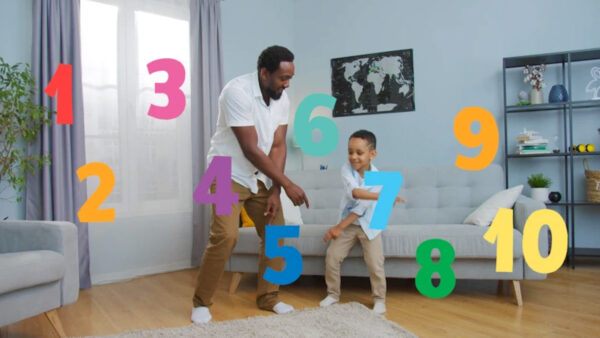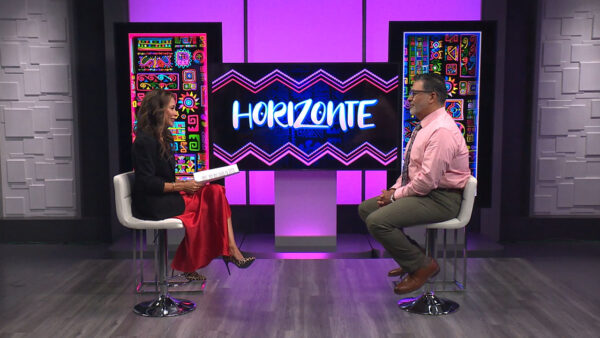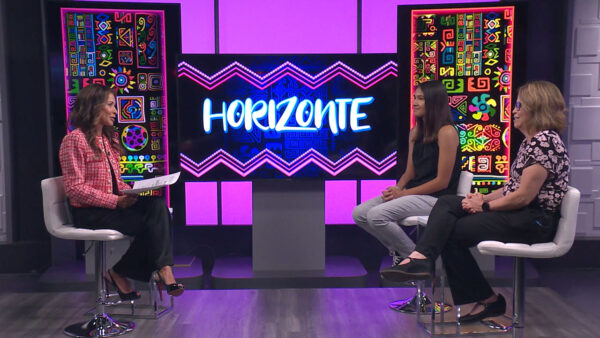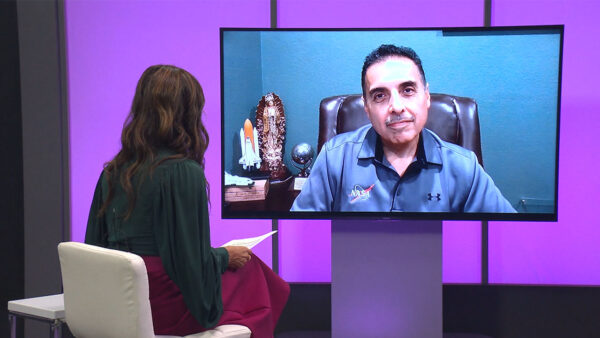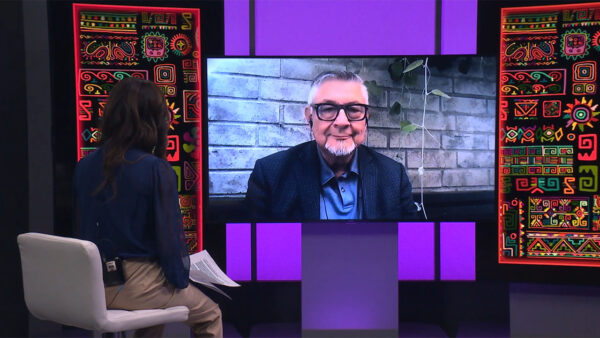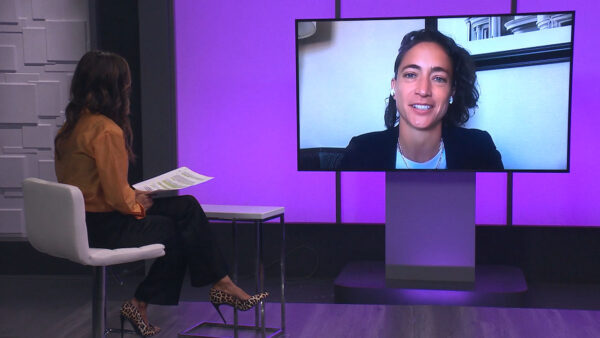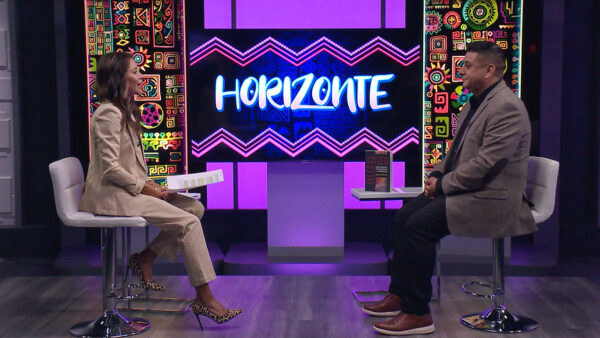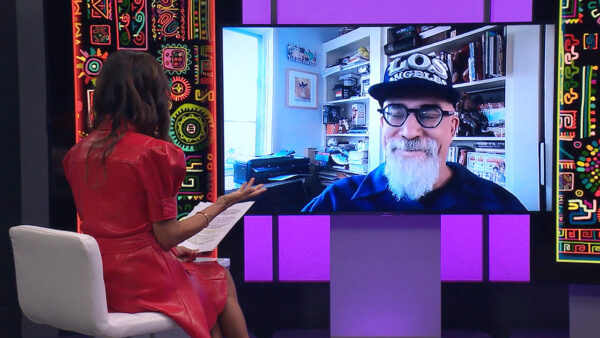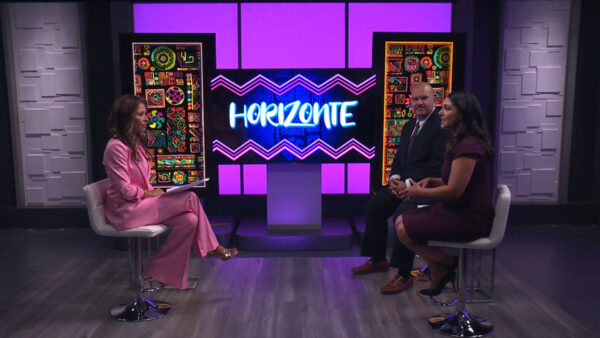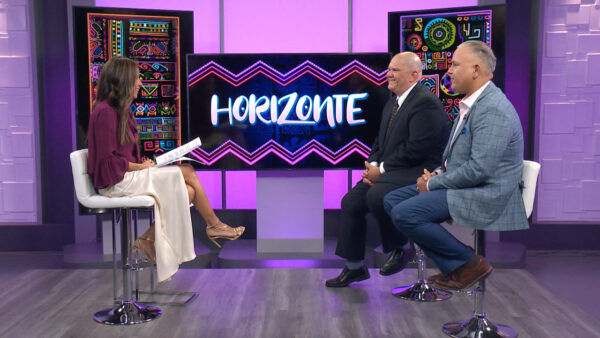Former Major League Baseball catcher and World Series champion Bengie Molina talks about his book
Molina: The Story of the Father Who Raised an Unlikely Baseball Dynasty a biography of his father Benjamin Molina Santana who saw all three of his sons become major league catchers and collectively win six world series rings.
JOSE CARDENAS: He's a former major league baseball catcher and world series champion. Benjamin Molina, known as Bengie, has played for the Anaheim angels, the Toronto Blue Jays, and the San Francisco Giants. He is here to talk about his book "Molina-the story of the father who raised an unlikely baseball dynasty." it's a biography of his father, Benjamin Molina Santana, who saw all three of his sons become major league catchers and collectively win six world series rings. Joining me now is Bengie Molina. Mr. Molina, welcome to "Horizonte." You know, you and your brothers have been compared to the DiMaggio brothers, Vince, Joe, and DOM, many, many years earlier. Obviously at this date and time you guys are better known. I want to start, the book is dedicated to your father. It is really your story, I think, in many ways and the influence your father had. But I want to start. We have pictures. One that has a picture of him because he is in many ways a central figure. Was that a picture of him when he was a young man, this is when he was playing -- how old was he in this picture?
BENGIE MOLINA: I couldn't tell you. I think he was around, in the early 20s in this picture.
JOSE CARDENAS: And he was famous in Puerto Rico, that is where he was and you were born there. Everybody thought that he was one of the best baseball players to ever come out of Puerto Rico.
BENGIE MOLINA: What people don't know -- well, they know the three Molinas in the major leagues because we are always in the spotlight and all of that. But he was inducted in the hall of fame of amateur baseball, same night that we won the game 7 World Series game in 2002. So, that same night, he was inducted into the hall of fame. That means he was a great, great, awesome player, but not only that, he got inducted years later into the amateur little league hall of fame, too, for what he did for the community and for the kids, you know, teaching them how to play ball.
JOSE CARDENAS: He built a baseball field by your house. And that is where you and your brothers played and many other kids in the community.
BENGIE MOLINA: Yes, when we started, nobody wanted us. We were so bad. All of the teams wanted all-stars and players that could play. My dad saw me very sad. He saw a lot of workers, coworkers' son that never made the team, and so he wanted to make a team. He found a grass area and he started to make a field out of it so that we could play. And today, man, it is a great field.
JOSE CARDENAS: We have another picture of -- much later, your dad and your mom. And I want to put it up because in reading the book, your mom is a central character. And, in fact, almost -- maybe even tougher than your dad in terms of if you made a mistake playing baseball, she got on you.
BENGIE MOLINA: Oh, my mom, I always say if I ever manage in the major leagues she would be my bench coach.
JOSE CARDENAS: This is when you were in the major leagues.
BENGIE MOLINA: The first time ever for all three of them, my brother and my dad and my mom, to see us in the major league uniform in the United States. Obviously they seen us on TV, but in person, this is the first time ever.
JOSE CARDENAS: And Yadi, a young boy in this picture, but now the catcher for the cardinals.
BENGIE MOLINA: Yes.
JOSE CARDENAS: Won two World Series rings?
BENGIE MOLINA: Two world series, three platinum gloves, which says a lot. Best defender of both leagues. They pick one for every position and he has been that for three years.
JOSE CARDENAS: Your own journey in baseball was a little different than your brother's. They were natural catchers and from the start that is the position they played. You were -- you couldn't get anybody to draft you.
BENGIE MOLINA: Oh, man, I don't know. My journey was kind of tough. I always call myself the almost, I almost threw 90 miles an hour, I almost run fast enough. Didn't have enough power. So, nobody drafted me for three years. And -- but, you know, my mom and dad never let me give up or never let my guard down, you know. They never let me do that. So, they were very passionate, you know, parents, and baseball, too. And they wanted me to keep going. Keep practicing. You never know what is going to happen.
JOSE CARDENAS: They wouldn't let you come home when your first experience in the United States, Yuma Arizona, playing ball for Arizona western.
BENGIE MOLINA: I thought I was going to Florida. Kind of funny. I was in Oregon playing American legion baseball world series, and I got recruited to go to western college, but in my head, for some reason I thought I was going to Florida. And two short flights and here we are in this heat, you know. And all of the sudden I'm like I never remember Florida being this bad, this desert and hot and trees and everything like that. And as everybody knows now, we were in Yuma, Arizona, instead of Florida, but it was kind of funny.
JOSE CARDENAS: And you wanted to go home. Called your parents --
BENGIE MOLINA: Two weeks. I don't know if you remember the collect calls. I made collect calls for two weeks straight and wanted to go home. And my dad said something very important to me that got in my head. He said just wait. Wait until your practice starts. If you don't like the practice, you come home. I'll pay for your ticket. It is like if he knew that once -- like that he knew once baseball started, I was going to speak the same language. It is not English, Spanish, it's nothing like that. Baseball was the same everywhere. First base, second base, pitcher mound, all of that. He told me that, and once we started practicing, it changed everything.
JOSE CARDENAS: That was part of the problem you were having you didn't speak very good English. You were a star at Arizona western.
BENGIE MOLINA: I was, like I said, it was the same game. It was baseball. I had to throw a ball to the plate and I have to hit it. I have to catch it and run and everything. So, in that matter, I was fine. I was struggling a little bit in my English and all of that.
JOSE CARDENAS: We have another picture. This is when you finally make it up to the major leagues on one of the double A teams here. But to get there, you had to switch from the position you had been playing. You played just about every position on the field except catcher.
BENGIE MOLINA: Yeah, I never caught in my life until 17 when the scout gave me the catcher's glove and I became a catcher from that scout. But before, I was everything. In this picture, I was already a catcher in double-A. And very close, very, very close to the major leagues when you are in double A you feel a little closer. Many things happened before that picture right there.
JOSE CARDENAS: Before that picture, you weren't drafted at all.
BENGIE MOLINA: No, three years I spent next to my phone, our phone at home waiting for a call for the draft. It never happened. I was very down. I thought I had failed my dad, of course, but, no, they never let me die. They kept forcing me to practice and keep doing your job and getting better.
JOSE CARDENAS: And it finally paid off. We have another picture here of one of your World Series visits. This one is you on the mound when you were an Angel. I want to talk about what it means to be a catcher because it is a pretty complicated position.
BENGIE MOLINA: Being a catcher, you have to be not only the toughest one of the field body-wise, but also you have to be the toughest one mentally. You have to be the -- I always call it the smartest guy out there because you have to know every single pitcher, what their tendencies are, how they behave. You have to become a psychologist sometimes. You have to be a friend. You have to be a brother. You have to be somebody that they might not like out there. But it will make them perform better. The catcher is -- that is why you see a lot of managers these days being catchers is because we actually see the game different than everybody else and it is because we do all of the little things that we do on the mound and we talk and we become friends and family out there.
JOSE CARDENAS: And as I mentioned, it finally did pay off. I think we have a picture, a last one of you on one of those trips to the World Series. I think this is when you guys beat the -- I forget what team you beat to --
BENGIE MOLINA: Yankees.
JOSE CARDENAS: You beat the Yankees and then you end up in the World Series for the rangers playing your former team the giants.
BENGIE MOLINA: Weird. Everybody thought it would be easy to pitch against them or hit against them, but it was the opposite. It was very difficult. It was very hard. I didn't know them like I thought I did because I played with them, but it was really tough. Very confusing.
JOSE CARDENAS: Talking about tough things. Less than a minute left. One thing that motivated you over all of this time that made you stick to it you thought you were fulfilling your father's dream, something that he was never able to accomplish playing in the majors. He passed away in 2008. Then you found out that was not his ambition.
BENGIE MOLINA: That was not his ambition. He wanted to be a great human being. He wanted to be a family man. He wanted to take care of his sisters, his brothers, he wanted to become a respected man.
JOSE CARDENAS: and he passed up a try out because your mother was pregnant with you.
BENGIE MOLINA: Yes.
JOSE CARDENAS: Great lesson, a great book, a lot of things to be learned from a great role model. Thank you for joining us on "Horizonte" to talk about it. I understand that you are signing books changing hands in Phoenix Thursday at 7:00.
BENGIE MOLINA: Yes. Thank you
JOSE CARDENAS: Good luck. Thank you so much. And that's our show for tonight. From all of us here at "Horizonte" and eight, thank you for watching. I'm Jose Cardenas. Have a good evening.
VIDEO: Funding for "Horizonte" is made possible by contributions by the friends of eight, members of your Arizona PBS station. Captioning Performed by LNS Captioning www.lnscaptioning.com
Bengie Molina:Former Major League Baseball Catcher and World Series Champion
